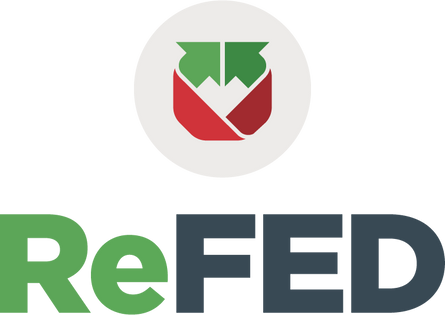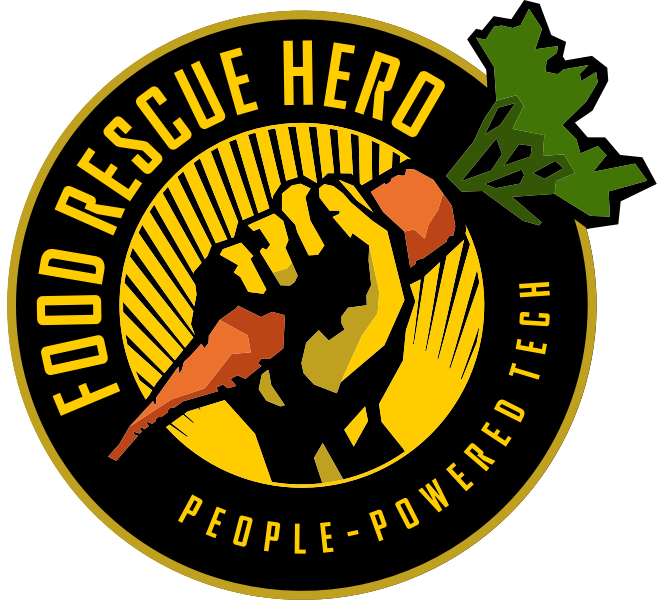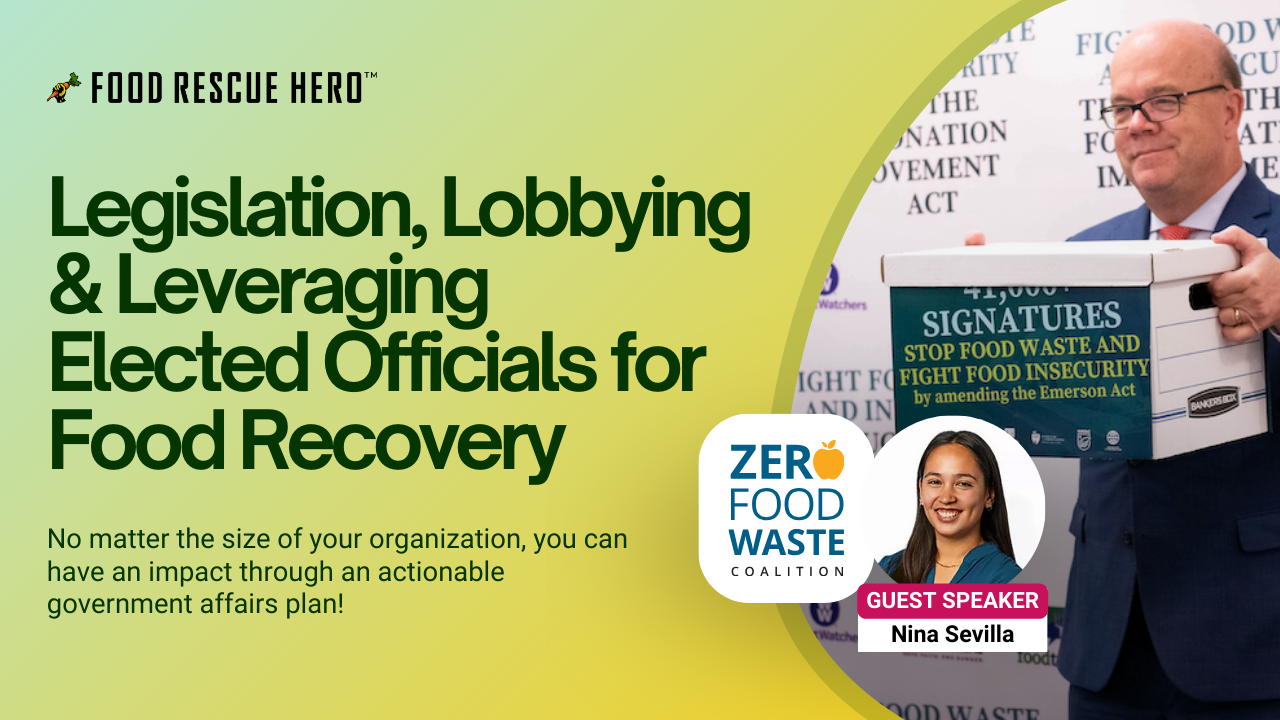As people working in the field of food recovery, we can often deem politics, politicians and elected officials outside of our area of interest. But it pays to think about how you can leverage a good relationship with your local, state, and federal officials to help make food recovery more successful. Elected officials and government agencies can help amplify your message, create legislation that supports food recovery and prevent bad legislation that undermines efforts to stop food waste and end hunger.
Watch our March 2024 webinar:
"Legislation, Lobbying & Leveraging Elected Officials for Food Rescue"
Why have a governmental relations strategy?
There are a few key reasons why knowing your elected officials and engaging them in your work is important to not only the success and growth of your organization, but to the adoption of food recovery as a solution to food insecurity, food access, and food waste.
Firstly, once you have created a relationship with elected officials, they can amplify your mission and become a community advocate for your work. Just this month, our Pittsburgh partners, 412 Food Rescue, celebrated nine years of operation by inviting local elected officials to participate in “Food Rescue Hero Week”, where officials completed food rescues in the app and got to see firsthand the monumental impact that volunteers, food donors, nonprofit partners, funders, and supporters are making in the community.
Government officials who are aware of your organization’s work and the impact it’s making on the community can then help write, sponsor, champion and hopefully pass legislation requiring food distributors to donate surplus food, as well as legislation recognizing food recovery as a solution to food waste and hunger.
In addition to enacting new helpful legislation, these relationships also come into play when potentially harmful legislation is on the table. Again, using Pittsburgh as an example, a couple years ago the local health department wanted to write new regulations to protect food rescue efforts, but their proposed language inadvertently restricted food recovery operations, and were based on a lack of understanding not first hand knowledge. Because 412 Food Rescue already had relationships with some of the elected officials, they were able to join the conversation, advocate for updated language, and forestall the dramatic impact the proposed change would have had on community members’ ability to access rescued food.
By enacting laws and policies that incentivize food donation, streamline redistribution processes, and mitigate liability concerns for donors, governments can create an enabling environment for reducing food waste while ensuring its safe and equitable redistribution. Since there are thousands of other issues for elected officials to be aware of, it’s crucial that your organization maintains relationships with members at each level–local, state, and federal–in order to keep them updated on operation and impact enacted through your work.
Advocacy vs. Lobbying
Food recovery organizations of all sizes can help promote this through advocacy and lobbying. But while advocacy and lobbying are often grouped together, they differ in their scope and methods, as well as what’s allowed when acting on behalf of a 501(c)(3).
Advocacy
Advocacy involves making one’s voice heard on issues that impact the individuals or communities being served. It encompasses a broad range of activities aimed at raising awareness, shaping public opinion, and advocating for systemic change. Most nonprofits actively engage in advocacy as part of their mission to address societal issues and achieve their goals.
When it comes to engaging with elected officials, advocacy can include:
- Telling legislators and supporters how a federal grant helped constituents
- Educating a member of Congress about the effects of a policy
- Inviting a member of Congress to visit your organization so that they may see how funding affects operations and the difference it makes.
Lobbying
Lobbying refers to direct efforts to support or oppose specific pieces of legislation. It involves interacting with policymakers, advocating for specific proposed legislation or policies, and seeking to influence the legislative process. Unlike advocacy, lobbying is more narrowly focused on legislative outcomes and can occur at various levels of government.
Lobbying can look like:
- Asking a member of Congress to vote for, against, or amend introduced legislation
- Asking your supporters to contact their members elected representatives to request activity on introduced legislation
- Preparing materials or organizing events in support of lobbying activities
However, there are specific regulations, such as those outlined by the IRS for 501(c)(3) organizations, that govern the amount of resources that can be allocated towards lobbying activities.
Restrictions on Activities of 501(c)(3)s
A 501(c)(3) organization is limited in how much lobbying they can do. You may engage in some lobbying, but if you violate rules, you risk loss of tax-exempt status.
Determined by the IRS, lobbying may not constitute a “substantial part” of the activities of the 501(c)(3) organization. Note that this “substantial part” is typically a threshold that most small to midsize mission driven nonprofits would never come close to reaching with their lobbying efforts.
If your organization is doing a substantial amount of lobbying work, you can file IRS Form 5768 – indicating that your organization plans to engage in permitted lobbying activities. If you don’t file Form 5768, it’s up to the IRS to determine what a “substantial part” is. But if you do fill out Form 5768, there is an expenditure test, which is a measurable number. Using this rule, a non-profit is limited to spending 20% of the first $500,000 or your budget, plus a progressively smaller percentage of subsequent budget thresholds. Remember – staff time is also counted towards this 20% threshold!
Regardless of how much time and money you spend, when lobbying as a 501(c)(3), you cannot campaign for a specific candidate, or state opinions about who your supporters should vote for. You can lobby for a piece of legislation, educate officials on what you do, or ask your supporters to call their representative and ask them to vote a certain way.
Legislative Opportunities
Farm Bill
The Farm Bill is a bill that is revisited and passed every five years. However, the 2018 Farm Bill is still the current operating bill, as the renewal set for 2023 was voted to be extended for an additional year, through September 2024. The Farm Bill denotes where funding is appropriated across 12 “titles” covering crop insurance, nutrition, conservation, and more.
According to Nina Sevilla of the NRDC, the Zero Food Waste Coalition identifies four top recommendations to advocate for to be included in the next iteration of the Farm Bill:
- Create a FLW Reduction Office in USDA & authorize funding for it to offer grants and support food waste reduction
- Increase funding for planning & infrastructure that reduce food waste and enhance food recovery
- Fund research in food waste prevention, upcycling, and recycling solutions
- Standardize and clarify date labels
Leading the Way for the Farm Bill
There are several marker bills right now in congress that we can support in order to help move the needle on food waste in the Farm Bill. Marker bills are not intended to pass as standalone bills; they are introduced to show collective interest in an idea and build momentum. Often, the language used in these marker bills are intended to be an example–or copy and paste–of what is desired to be included in a larger package bill, such as the Farm Bill.
Marker Bill 1: NO TIME TO Waste Act
This bipartisan bill is in both the House and Senate:
- Strengthens federal agency coordination on food waste
- Establishes an Office of Food Loss and Waste at USDA
- Support public-private partnerships that commit to reducing food loss and waste
- Strengthens current USDA research programs to include food loss and waste as part of their priorities
- Provides support to States to assist local food recovery infrastructure and coordination efforts
- Starts a public awareness and education campaign at USDA
Marker Bill 2: Food Date Labeling Act
This bipartisan bill is currently only in the House:
- Streamlines date labels on food to two terms: “BEST If Used By” (quality date) or “USE By” (discard date)
- Food manufacturers can decide which of their products carry a quality date or a discard date
- Allows donation of food past quality date
- Requires consumer education on meaning of date labels
Other Legislative Opportunities
The following marker bills are also recommended by the Food Research & Action Center (FRAC) as pieces of legislation to support. These more generally address food access:
- Closing the Meal Gap Act (H.R.3037 | S.1336 )
- Improving Access to Nutrition Act (H.R.1510 | S.2435)
- Enhance Access to SNAP Act (H.R.3183 | S.1488 )
- Hot Foods Act of 2023 (H.R.3519 | S.2258 )
- Lift the Bar Act (H.R.4170 | S.2038)
Some of these other marker bills would include expanding who is eligible for SNAP benefits, increase foods available to purchase with SNAP dollars, and overall lift barriers to food access.
A few more ways to influence legislation and get your organization’s priorities supported:
- Annual appropriations is the government’s budgeting process for each year, and they’re currently working on the 2025 budget. One big focus for the NRDC is advocating for more staff within the USDA; currently, there is only one staff member, the Food Loss & Waste Liaison, doing the work that could be vastly improved if there was an office with more staff and resources.
- The Child Nutrition Authorization Bill covers school meals, after-school meals, summer meals, and WIC. This bill is also supposed to be passed every five years, but the presiding version was passed in 2010 and has been extended every since.
It is possible to get pieces of legislation passed as standalone bills, but this rarely happens in Congress. That’s why it’s often more fruitful to focus on bigger legislative packages like the Farm Bill, annual appropriations, or the Child Nutrition Authorization Bill in order to advocate for smaller pieces that support the work of food recovery to be included within a larger package that will usually pass one way or another.
Creating a Plan
So how can your organization take this information and turn it into a plan for your own government relations strategy?
First things first: figure out who your officials are–who is important to your locality, and to the topic of food waste and hunger–and keep a running list with names, offices, and contact information that is regularly updated.
Once you have your list, get to know as many of them as possible. Go visit them, educate them about the work that you do, and even get them involved by doing a food rescue with your organization if you can! The opportunity for this firsthand experience goes a long way in their understanding of not just your mission, but the tangible impact it’s having on the community and their constituents. Then, if you later approach them asking to advocate for something, it will resonate more personally, as opposed to getting lost as just another email or letter they receive asking for support.
Even if you aren’t currently working to advocate for specific legislation, keep sharing your organization’s impact with them. Send your annual impact report, invite them to your end-of-year event with funders and other stakeholders with whom you share the outcome of their investment and participation.
When you do decide it’s time to advocate for relevant legislation, be sure to look at your priorities, as well as opportunities and potential threats that are currently on the table.
Federal: Farm Bill; Food Donation Improvement Act
State: State-wide food waste ban; create a coalition with other organizations; Department of Environmental Protection funding
Local: Local food waste ban; health code rewrites
Whatever legislation you choose to prioritize, be sure to create the right size government relations plan that fits your organization’s capacity.
ADVOCACY
- Share on social media
- Leverage your supporters
- Create a campaign
LOBBYING
- Send an email/letter to appropriate legislators
- Call their office to register your interest
- Create a lobby schedule and visit each one for a one-to-one conversation
Stay Informed
Be sure to follow and subscribe to many of the following organizations with resources and coverage of local and national legislation surrounding food waste and food access:



A Call to Action
No matter the size of your organization, you can and should have a government relations plan in place! Ultimately, whether through advocacy on social media or lobbying through direct engagement with legislators, every organization has the potential to make a meaningful contribution towards shaping legislative agendas that prioritize food recovery and address the pressing challenges of hunger and food waste. Your small part means we can have a greater impact, together.




